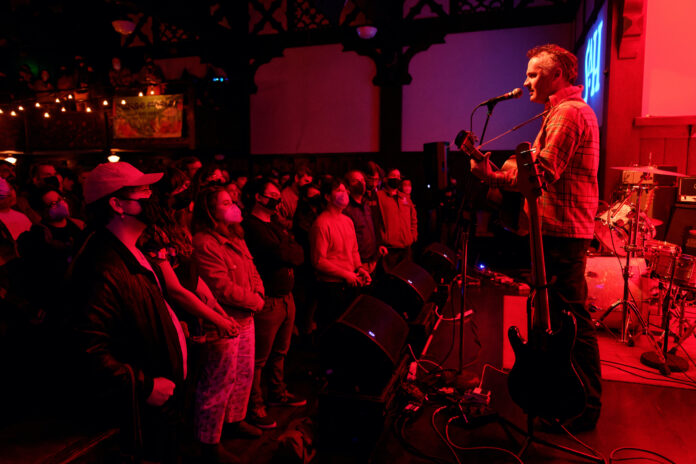Anyone as serious as their art is generally not to be trusted. When I encounter experimental musicians with a dour, commanding, unsmiling demeanor, as if they are trying to make you know that what they do is important and meaningful, I see only a lack of confidence. The avant-gardists I like best are the ones able to crack a joke at their expense, because they have enough faith in their work and in their audience to know that their intent will still come through loud and clear.
The three artists I saw at Noise Pop this year embodied this kind of confidence: Arooj Aftab, Phil Elverum, and William Basinski all grapple with personal and potentially uncomfortable themes.
Aftab’s Vulture Prince from last year mourns her late brother Maher, while Elverum’s work since the death of his wife Geneviève in 2015 has been, in some ways, a rejection of the “conceptual emptiness” that was the grand theme of his earlier work. Basinski, meanwhile, uses his archive of decaying tape loops to play with death, inevitability, and the passage of time. His best-known work The Disintegration Loops is often described as an elegy for 9/11.
And yet all are colorful personalities, make jokes, know when and how to lighten the mood. I love when stage banter conflicts with the tone of the music. Aftab’s expansive, meditative, somber songs generally went on for six or seven minutes at a stately pace. Once the audience had fully marinated in them, her jokes about unruly shirt buttons let us come up for air. Elverum’s performance of his autobiographical song-album The Microphones In 2020 was punctuated by little ad-libs and wise-cracks, but people were still tearing up. He was happy to goof off with fans at the merch table (though he’s not an easy man to break the ice with; as charming, and soft-spoken as he is, a lot seems to be going on in his head at any given time.) As for Basinski, his non-rhotic New Yorker OG-gay-punk sass is just delightful—not to mention his fist-pumping enthusiasm whenever a particularly epic tape loop dropped.
Aftab and Basinski performed at Grey Area, Elverum’s Microphones project at Swedish American Hall. I’m not sure Grey Area was the best venue for Aftab, whose small band seemed dwarfed by the large and impersonal venue. The slow-moving beams of light accompanying Basinski were perfect for giving the impression of a pain-staking process. (The machine firing blasts of stage fog at Basinski opener Faten Kanaan looked more like it was farting in her face.) But I can’t imagine a better pairing of venue and performer than Elverum at the Swedish American Hall. Low ceilings and great wooden gables built over 100 years ago made the perfect staging for a man whose music often seems to encompass everything that has ever happened.
Opener Ragana had a bit of that, too: a mossy pairing of Northwest doom and the anarcho-witcho-feminism of the Oakland experimental scene, righteously screaming “you take nothing!” Many of the openers came from Oakland. These included Maria B.C., a rising dream-pop singer-songwriter whose set cast a spell until it was interrupted by unintentionally funny samples of sped-up self-help talk. Joining her was fellow East Bay denizen Piano Rain, who dedicated a set of epic-collage not just to Ghost Ship (she had been present, and was even on the night’s lineup, when the underground venue’s devastatingly fatal fire started in December 2016), but to “The Titanic and Noah’s Ark.”
Overall, Noise Pop did a great job selecting bands from the local DIY rock scene, like slow-punk three-piece Buzzed Lightbeer and Milk Bar regulars Loserlees. Sadly, secondhand accounts tell me the local-band happy hours at Bender’s Bar and Grill allegedly suffered from poor sound, and that Catch Prichard’s whole band came down with COVID.

Due to commitments with my own musical projects, I was unable to see more than those three shows. I almost went to see Alex G, the Bandcamp hermit who came to fame with brilliant DIY pop albums like Race and Trick. But I feel like he’s the kind of artist for whom it helps to know the songs before you see the show, and I’m still working my way through his catalog. Jersey heartland rockers Titus Andronicus played their 2010 epic The Monitor in full early in the fest, and though it’s an album I love, I find full-album performances uninteresting. Seemingly-uncancelable New York firespitter Azealia Banks headlined the Warfield on the same night as Basinski, and it’s easy to think of Basinski’s set as a more chilled-out alternative.
But scheduling issues be damned — the three performances I saw at Noise Pop were above all else proof that sedate and serious music can be a blast, too.







